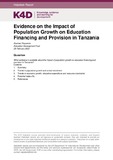| dc.contributor.author | Fitzpatrick, Rachael | |
| dc.date.accessioned | 2022-07-18T07:18:55Z | |
| dc.date.available | 2022-07-18T07:18:55Z | |
| dc.date.issued | 2022-02-28 | |
| dc.identifier.citation | Fitzpatrick, R. (2022). Evidence on the Impact of Population Growth on Education Financing and Provision in Tanzania. K4D Helpdesk Report. Brighton, UK: Institute of Development Studies. DOI: 10.19088/K4D.2022.072 | en |
| dc.identifier.uri | https://opendocs.ids.ac.uk/opendocs/handle/20.500.12413/17549 | |
| dc.description.abstract | Tanzania has made great strides in increasing enrolment rates amidst a rapidly growing population. However, despite gains made in primary enrolment, completion rates have not exceeded 70% in the past five years, and enrolment at secondary level remains low (37%).
An analysis of expenditure suggests a lack of equitability in distribution of funds within the education sector. Having achieved near universal enrolment at primary level, since 2016 the Government of Tanzania has almost doubled spend on secondary education and increased spending on higher education. In the same period, however, spend per pupil at primary level has halved suggesting that budget is being directed away from pre-primary and primary education to fund secondary, with higher education slightly increasing. Furthermore, the Education Sector Analysis outlines that 35% of the education budget is spent on the top 10% highest educated in the system (Kahangwa et al. 2021, 168). In addition to disparities on spend by education level, regional differences persist in the number of classrooms, textbooks, desks and teacher shortages also exist.
Despite current disparities and challenges, Tanzania’s economic growth in recent years suggests that, with increased commitment in minimum spending on education as a proportion of GDP, the education needs of the population could be met. However, this would assume continued economic growth and require a greater proportion of spend to be allocated to education, suggesting trade-offs may be required. | en |
| dc.description.sponsorship | Foreign, Commonwealth and Development Office (FCDO) | en |
| dc.language.iso | en | en |
| dc.publisher | Institute of Development Studies | en |
| dc.relation.ispartofseries | K4D Helpdesk Report;1102 | |
| dc.rights.uri | https://www.nationalarchives.gov.uk/doc/open-government-licence/version/3/ | en |
| dc.subject | Children and Youth | en |
| dc.subject | Education | en |
| dc.subject | Finance | en |
| dc.title | Evidence on the Impact of Population Growth on Education Financing and Provision in Tanzania | en |
| dc.type | Helpdesk | en |
| dc.rights.holder | © Crown copyright 2022 | en |
| dc.identifier.doi | 10.19088/K4D.2022.072 | |
| dcterms.dateAccepted | 2022-02-28 | |
| rioxxterms.funder | Department for International Development, UK Government | en |
| rioxxterms.identifier.project | K4D | en |
| rioxxterms.version | VoR | en |
| rioxxterms.versionofrecord | 10.19088/K4D.2022.072 | en |
| rioxxterms.funder.project | 238a9fa4-fe4a-4380-996b-995f33607ba0 | en |

